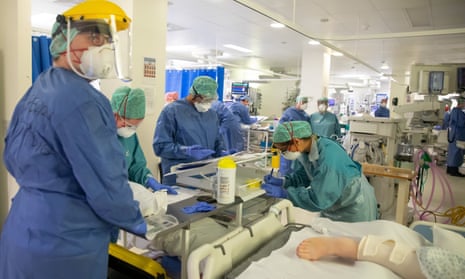Hospital doctors and public health experts have backed growing calls for a “circuit breaker” to stem the resurgence of Covid-19 and protect the NHS, as fresh signs of a cabinet split emerged.
As up to 95% of intensive care beds were reported to be full in some hospitals in Liverpool – half with coronavirus patients – growing concerns were raised about the NHS becoming overwhelmed. This week Liverpool said it would scale back non-urgent operations.
Labour backed the idea of a circuit breaker – a short lockdown severing some social contact – on Tuesday but cabinet ministers are understood to be split over its effectiveness and the desire to protect the economy.
On Wednesday the chancellor, Rishi Sunak, made clear that a national lockdown of any length would have significant and potentially irreversible economic costs.
The health secretary, Matt Hancock, and the Cabinet Office minister, Michael Gove, who chairs the Covid-19 operations committee, are the most spooked by the surge in case numbers and most open to a circuit breaker. Daily new lab-confirmed infections in the UK reached a new record of 19,724 on Wednesday.
There are fears that a shutdown might be extended beyond two weeks to help its effectiveness, and that high-level curbs would have to continue afterwards across many parts of the UK.
“It doesn’t change the fundamental path of the virus, it’s just a delay,” said a Whitehall source. “What you really need is to design a version of normal that can get you through the winter.”
Even those most sceptical about a circuit breaker concede that more drastic action might not be ruled out. “It is a last resort,” one cabinet minister said.
A cabinet source added: “No one is enthusiastic about this. Everyone is worried about lockdown but also worried about the virus being out of control. The camps in the cabinet are not straightforward.”
The Hospital Consultants and Specialists Association, which represents 3,500 senior hospital doctors, told the Guardian on Wednesday that a series of two- to three-week mini-lockdowns might be needed across the UK to get the population through winter without the NHS becoming overwhelmed, and to buy time for a coronavirus vaccine.
“We are in favour of a circuit breaker,” said Claudia Paoloni, the association’s president and a consultant anaesthetist in Bristol. “Unfortunately we find ourselves in an inimitable situation in that it’s one thing that we can do to buy ourselves some time and suppress this down to a more manageable level again.
“Covid is increasing in every area. Therefore we need to put some brakes on everywhere to try and reduce the extent of the Covid growth to a manageable level. That would buy us time to improve our testing capacity and enable us to keep hospital beds free to do elective work.”
Failure to introduce a circuit breaker as a matter of urgency risked the government having to order a prolonged return to the sort of full lockdown put in place in the spring, Paoloni added. “The circuit breaker should start as soon as possible. To get us through the winter … you might need a series of circuit breakers to keep the transmission suppressed.”
The British Medical Association said it supported a temporary short-term lockdown but only as part of a new “robust prevention plan” involving stronger restrictions than the three-tier system that Boris Johnson announced this week, and clearer public health messaging to encourage compliance.
Chaand Nagpaul, the BMA’s chair of council, said: “National lockdown was previously lifted with absolutely no strategy for how to contain the disease afterwards, so it’s no surprise that the government and the country finds itself in this terrible position once again.”
Sue Crossland, the president of the Society for Acute Medicine, speaking in a personal capacity, said some hospitals were at a tipping point. “ A circuit breaker may act as a pressure valve to release some much-needed breathing space.”
The Royal Society for Public Health said a circuit breaker would save many lives. “The virus is out of control in much of England and the majority of scientific opinion is that action needs to be taken swiftly – and indeed is likely overdue – if we are to avoid thousands of unnecessary deaths, said Christina Marriott, its chief executive.
Katrina Stephens, the director of public health in Oldham borough, where there is a surge in infections, said a circuit breaker over the October half-term was needed. “I think infection rates have got to a level where the circuit breaker approach could potentially be a good move,” she said.
However, health officials conceded that time was running out for minimising the disruption in schools should a circuit breaker be used. Cabinet ministers underlined Johnson’s commitment not to close schools and the incompatibility with a circuit breaker lasting longer than the week of half-term. Keir Starmer, Labour’s leader, said he would prefer schools to stay open.
Speaking in the Commons, Sunak said any form of national lockdown would cause “significant damage” to lives and livelihoods. He said evidence still supported a regional, tiered approach. “The entire country would suffer, rather than targeting that support preventing a lockdown in parts of the country where the virus rates are low.”
